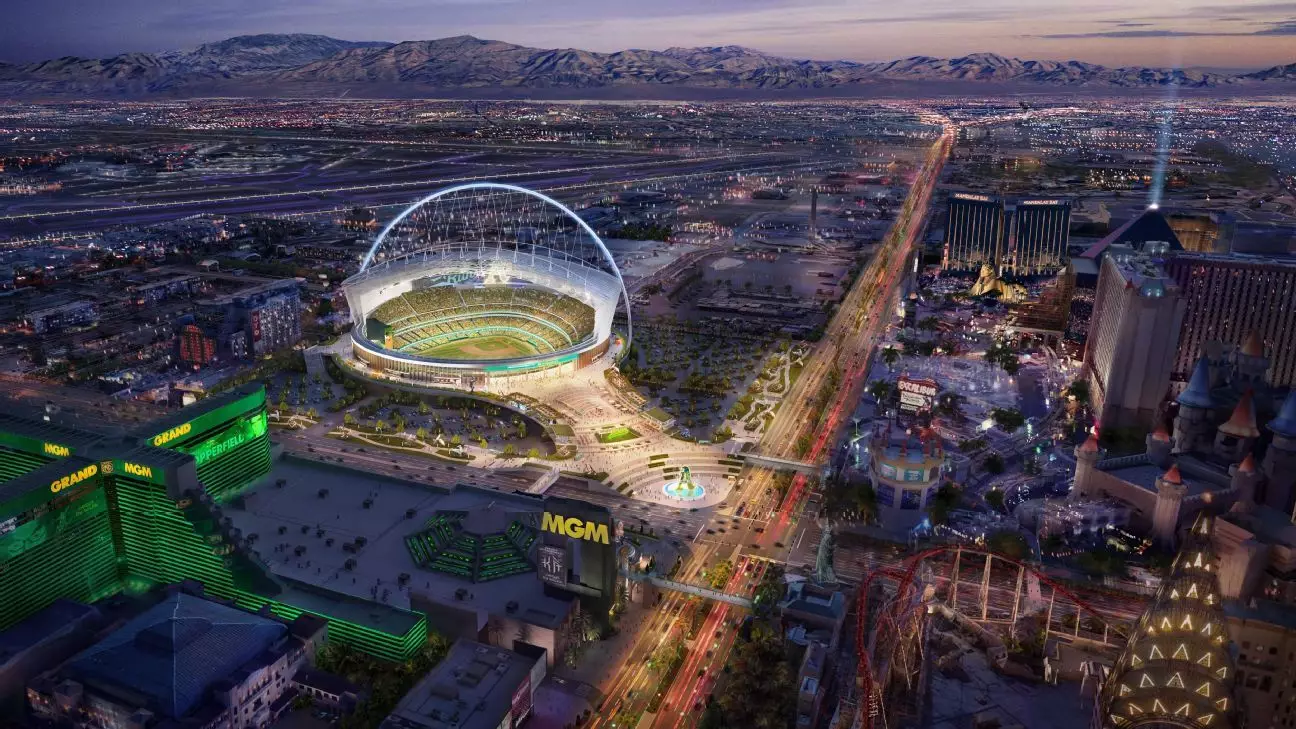The unfolding narrative of the Oakland Athletics’ relocation to Las Vegas marks a pivotal moment in not only the history of the franchise but also for the burgeoning sports culture in Las Vegas. With the recent approval from the Las Vegas Stadium Authority to advance plans for a $1.75 billion stadium, this move signals the transformation of Las Vegas into a multifaceted hub for major professional sports.
On Thursday, the Las Vegas Stadium Authority made significant strides by approving crucial lease and non-relocation agreements. These contracts solidify a commitment to ensure the team stays put in Las Vegas for a span of 30 years. Steve Hill, the CEO and president of the Las Vegas Convention and Visitors Authority, encapsulated the sentiment of the day when he described it as a significant milestone. This agreement not only highlights the resolve of local government in embracing professional sports but also sets the stage for the Athletics to enthrall fans in a new environment.
The excitement among attendees was palpable, with many recognizing the enormous implications of this move. The remarks from Sandy Dean, a member of the Athletics’ board, echoed the optimism of the event. He emphasized the team’s gratitude towards all stakeholders, signifying a collaborative effort that has brought them to this historic juncture.
While the recent approvals represent considerable progress, challenges remain on the road to constructing the Las Vegas stadium. Initial discussions with Clark County concerning development agreements are underway, with Dean expressing optimism regarding the county’s responsiveness to their timeline. The groundbreaking is anticipated for spring, aimed at welcoming fans in time for the 2028 season.
However, complications arise as the costs of the stadium have surged by $250 million due to inflation and the need for enhanced amenities. Planning for features like under-seat cooling systems and design adjustments to bring fans closer to the action reflects a strategic approach to fostering an engaging game-day atmosphere. Yet, Dean cautioned that additional costs might emerge, contingent on variables such as interest rates and evolving economic conditions. The financial prudence being emphasized hints at the complexities that lie in balancing luxury and affordability, a crucial consideration for the Athletics going forward.
In an era where financing large-scale sports projects often stirs public debate, the structure established for funding the Las Vegas stadium is noteworthy. With Nevada and Clark County providing $380 million in public funds, this investment symbolizes a considerable public-private partnership intended to bolster local culture and economy through sports.
The Athletics organization has already earmarked $100 million of its own funds, with club owner John Fisher further raising his family’s financial commitment to a staggering $1.1 billion. Notably, institutions like U.S. Bank and Goldman Sachs are reportedly stepping in to provide an additional $300 million loan. This robust financial framework serves to assure skeptical stakeholders that the Athletics have a sustainable plan in place, even as they explore additional equity investment options to reduce financial burdens.
Importantly, the agreement entails that the Athletics bear full responsibility for any additional costs beyond the established budget. This condition underscores the seriousness of the organization’s commitment to financial accountability while ensuring that the community will not bear the brunt of unforeseen expenses.
As the Athletics prepare for their imminent transition, five decades of history in Oakland come to a close, making way for a new chapter in Las Vegas. The team will play its next three seasons at a minor league ballpark in West Sacramento, California, a strategic move as they navigate logistics and fan engagement during the transition.
The landscape of professional sports in Las Vegas is rapidly changing, with the Athletics joining a league that includes the NFL’s Raiders, the NHL’s Golden Knights, and the WNBA’s Aces. The successes of the Golden Knights and Aces, who collectively have won three championships in recent years, further fuel enthusiasm and expectation among local sports fans. The arrival of the Athletics not only diversifies the sports offerings but could also rejuvenate local economies through enhanced tourism and business opportunities.
The Athletics’ move to Las Vegas represents an exciting evolution in Major League Baseball, forging a new path that could reshape the sports landscape in the region. With significant financial commitments, public engagement, and a clear vision for the future, Las Vegas is poised to become a vital player in the world of professional sports. The culmination of this venture will undoubtedly be closely watched, as all eyes remain on how the Athletics will redefine their legacy in their new home.


Leave a Reply